Medics resign over concerns about cervical screening
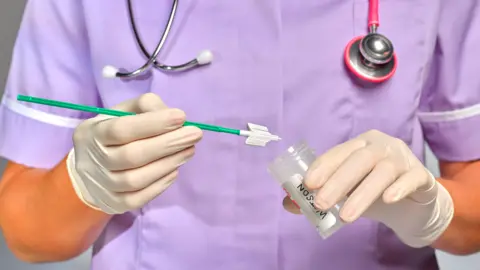 Getty Images
Getty ImagesTwo senior medics involved in Northern Ireland's cervical screening programme, have resigned over their concerns about the service, the BBC has learned.
In their resignation letter, seen by BBC News NI, the two health care professionals said the Public Health Agency (PHA) had ignored their misgivings, which included creating a new centralised cervical screening facility located in the Belfast Health Trust (BHSCT).
The doctors, who were leads in Quality Assurance, said the "scandal" around what happened at the Southern Trust could be "repeated" if action was not taken by the authorities.
The PHA has told BBC News NI that it "refutes" the significant assertions included in the resignation letter.
 Getty Images
Getty ImagesLast week, a highly critical report into cervical screening at the Southern Trust found women, including two who had died, had been failed over many years.
Following on from what happened at the Southern Trust, and to bring Northern Ireland in line with the rest of the UK's cervical screening programme, all of HPV (human papillomavirus) screening was moved to one site based at the Royal Victoria Hospital (RVH).
The two doctors - one who wished to remain anonymous and Dr Gary Dorman - said they resigned from the Northern Ireland Cervical Screening Programme (NICSP) after raising concerns stretching over several years including reducing NI's four cytology laboratories to just one.
Both hold substantive posts in the Northern Trust which until recently housed one of the cytology labs.
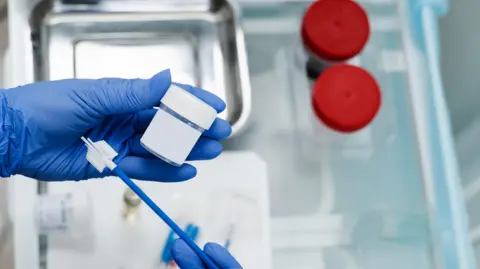 Getty Images
Getty ImagesIn their letter to the PHA, they alleged HPV testing was undertaken at the RVH without the proper regulatory accreditation, without a governance and accountability structure, and no documentation relating to screener underperformance.
They said they had made known their "deep concerns that major issues have not been acted upon in a way to ensure that the women of Northern Ireland will have the best possible cervical screening programme".
The two medics said the PHA had ignored their recommendations over a number of years "that their positions were untenable and therefore we must tender our resignations".
They urged the PHA "to take cognisance of this and take corrective action before it is too late and another major scandal falls within the (NI) Cervical Screening Programme".
If this was allowed to happen, it would lead to a "continuing lack of confidence in the programme and the PHA", said the doctors.
Cytology accreditation
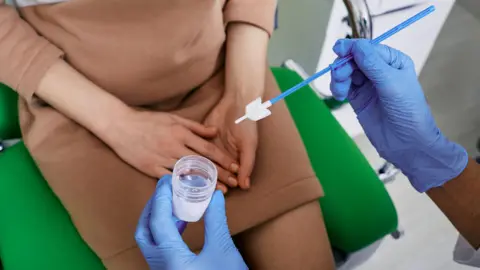 Getty Images
Getty ImagesIn a statement to BBC News NI, the PHA confirmed that the accreditation body UKAS suspended the accreditation of the Belfast Trust cytology service in October 2023 following an unannounced visit.
Also, that one of the reasons for the suspension related to screener underperformance which over a sustained period dropped below standard.
The BHSCT appealed this decision as screener performance was not calculated in the same way as England and according to the BT could not be directly benchmarked against England's standards.
After various concerns were addressed regarding documentation of processes and more detailed audit procedures cytology accreditation was formally restored almost one year later in June 2024.
According to the PHA and the Belfast Health Trust both are satisfied that there is "no persistent underperformance of screeners in the Belfast Trust."
'Heed the warnings of health professionals'

Alliance Party health spokesperson, Nuala McAllister said the resignations "only prompt more questions as to the efficacy of the cervical screening process and how it has been allowed to reach such a dangerous point."
The resignations of two senior medics, "after being made to feel their concerns were being ignored" is cause for extreme worry that "raises even more red flags", the assembly member added.
"I will be raising this issue at Health Committee, however in the meantime, I would implore the Health Minister to take urgent action amidst this chaos and uncertainty and call a statutory public inquiry."
To avoid repeating past mistakes, "we must heed the warnings of health professionals now... women's health is far too important for faith to be lost in such a crucial service," Ms McAllister added.
HPV testing
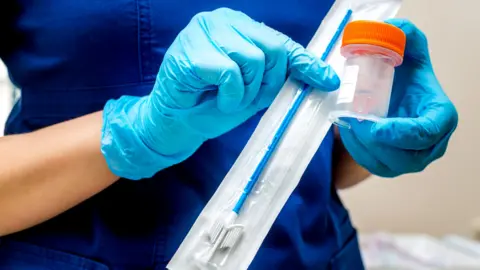 Getty Images
Getty ImagesBBC News NI can also reveal that HPV testing was abruptly stopped at the RVH centre in June 2023 when a Quality Assurance visit by the PHA found that the trust had put in place its own HPV testing process without being told officially to do so.
HPV testing resumed at the Belfast Trust when the new HPV single laboratory started officially operating on 1 November 2024.
The PHA has also confirmed to BBC News NI that the new HPV lab has yet to be accredited for HPV screening as the service is only up and running, that UKAS is aware of this and plans to visit in January 2025 to assess after several months of it being in operation.
While the PHA has apologised for what happened in the Southern Trust its repeatedly said that NI's screening Programme is a well-designed and effective programme which saves lives.
Also, that it's essential that women attend for screening when invited.
Smears sent to Gateshead
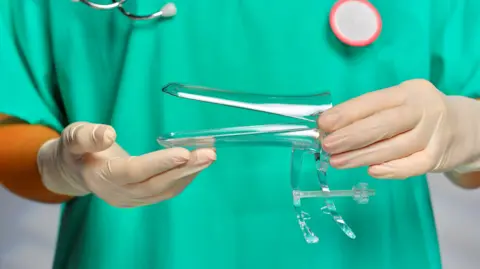 Getty Images
Getty ImagesDespite the new HPV lab operating, BBC News NI has learned that recently 5,000 smears were sent to Gateshead for HPV screening.
According to the Belfast Health Trust this was necessary as other labs had ceased screening and the PHA did not want to create a backlog and a delay in some women receiving their results.
They said this move was temporary.
Commissioning new laboratory
In their resignation letter, the medics alleged that the procurement process to run the new single lab was flawed.
In response, the PHA said it "strongly refutes" the allegation and that it was a HSC commissioning process rather than a public procurement process which is entirely different.
According to the PHA submissions from three of Northern Ireland's five health trusts were scored by an independent panel against several key criteria including service delivery, quality, staffing business continuity and value for money.
The PHA said the rationale for moving to one regional laboratory for cervical screening was driven by the need to concentrate expertise and staff resource in one area and that it recognised that staff working in other labs may have been disappointed by the outcome.
